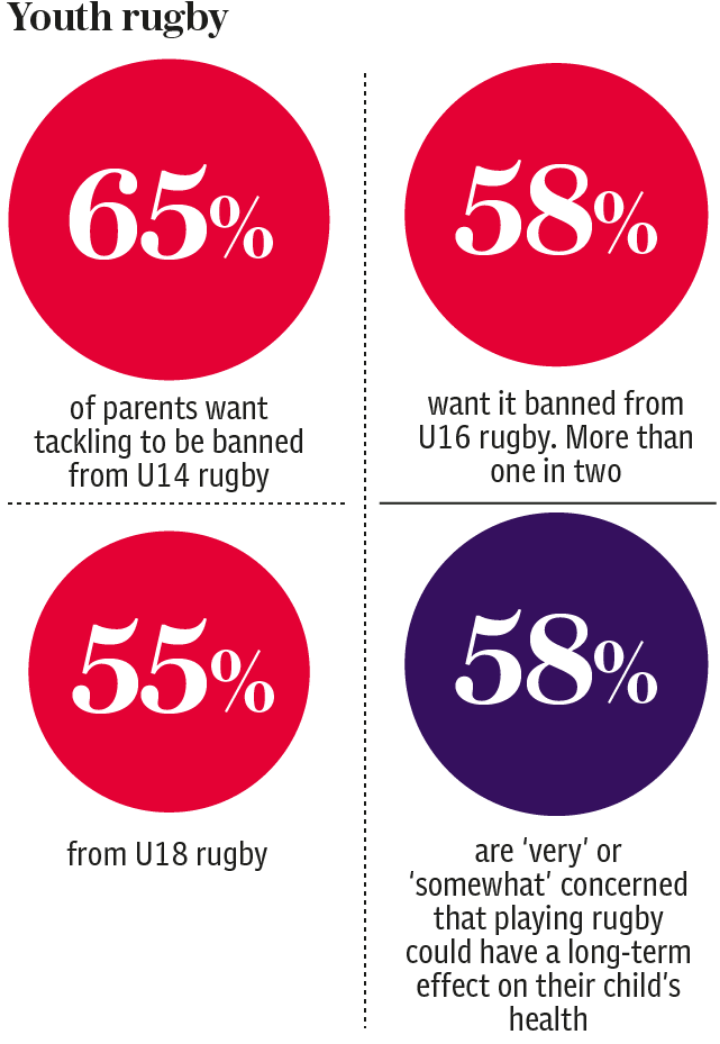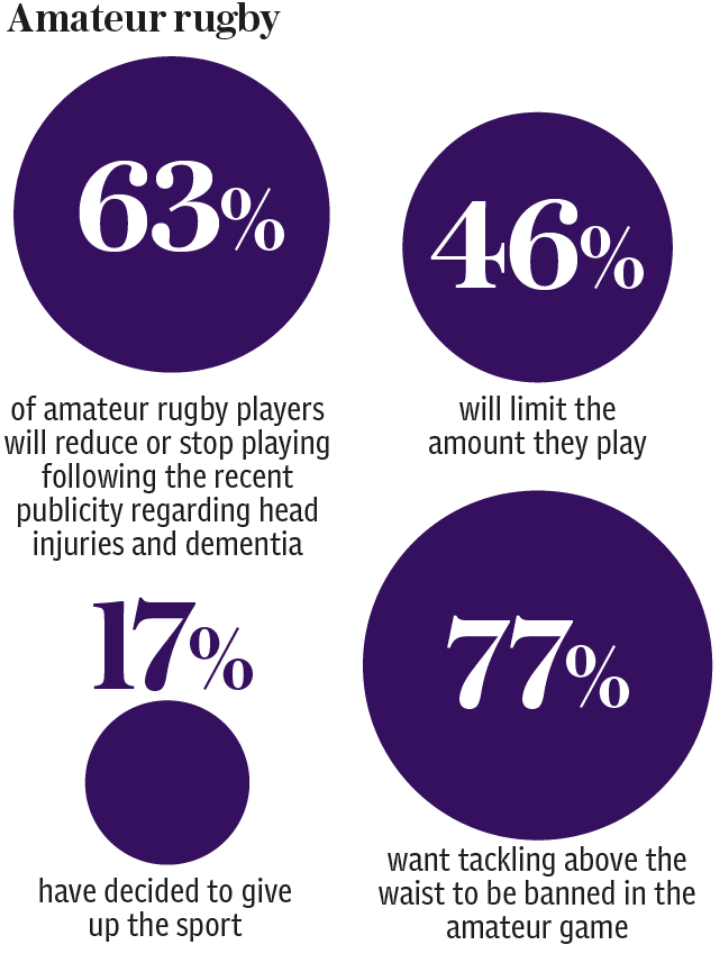Revealed: Players and parents call for sweeping change in grass-roots sport over brain injury fears

Amateur rugby and football players want sweeping rule changes to reduce brain injury risks after it was revealed that almost two thirds are concerned about the long-term health impact of playing their sport.
In the first major survey since professional football’s dementia link was proved, and legal action was launched by former international rugby players with neurological disease, the mounting fears of participants and parents across the grassroots game are today laid bare.
In rugby, it was found that:
One in six (17 per cent) adult amateurs intend to stop completely after hearing former players attribute rugby to early onset dementia and a further 46 per cent will limit their games
77 per cent of adult amateurs want tackling above the waist banned and 71 per cent want physical contact in training to be reduced
A clear majority of parents want all tackling and scrums banned from the youth game and physical contact in training to be minimised
64 per cent of adult amateurs are concerned that playing rugby could have an adverse impact on their long-term health
In football, it was found that:
70 per cent of adult amateur footballers now want clear guidelines to restrict heading in training
66 per cent are concerned about the effect of heading on their long-term health
Almost half of adult players want heading restricted in matches and 71 per cent of parents want it limited or banned in children’s football
67 per cent of parents are concerned about the risk from heading to their child’s long-term health
The survey, which was commissioned by The Drake Foundation and involved 2,000 interviews with adult amateurs and the parents of youth players aged between 11 to 17, will further amplify urgent calls for sports authorities to take action.
In rugby union, governing authorities are facing lawsuits from former players diagnosed with early onset dementia, including England’s 42-year-old World Cup winner Steve Thompson. In football, research has found that former professionals are 3.5 times more likely to die of brain disease. James Drake, whose foundation has invested more than £2 million researching neurodegenerative disease in sport, including collaborations with the Football Association and Rugby Football Union, said that he was “saddened but not surprised” by the scale of the concern.
“Whilst we all know that sport on the whole is good for us, there is no denying now that there needs to be a paradigm shift in both football and rugby’s approach to brain health, from grassroots through to the elite level,” he said.
“As we start to see changes in the professional games, we hope these findings will help to speed up the implementation of rule changes also to protect younger and amateur participants, so both rugby and football can be enjoyed safely by all.”
The findings in rugby are especially stark. A total of 66 per cent of parents wanted scrums banned from youth rugby, while more than half favoured a ban on tackling at Under-14 (65 per cent), Under-16 (58 per cent) and Under-18 (55 per cent) level. Almost 60 per cent were also ‘very’ or ‘somewhat’ concerned that the sport could affect their child’s long-term health.

After former players recently revealed their dementia diagnosis, almost two thirds of adult amateurs will limit their rugby or stop completely once Covid-19 restrictions are limited. A total of 42 per cent also said that they had been concussed while playing, of which 21 per cent continued without being reviewed by a doctor.
The survey did also find that 86 per cent of adult amateurs and 77 per cent of parents still believe that rugby is safe at their level.

The RFU said that player welfare was “fundamental and at the heart of the training delivered...at all levels” and highlighted their graduated introduction of contact. They also stressed that more variants of rugby, both contact and non-contact, had been introduced. “We welcome and will support any research that helps to inform player welfare as well as understanding the views of parents and players,” said a spokesperson.
The findings on football also found that the vast majority of parents (92 per cent) thought that the game was safe at their level but did highlight an alarming ignorance over concussion. In 40 per cent of concussion cases involving a child, it was reported that 69 per cent resumed playing during the same match of training session.

This figure rose to 73 per cent of amateur adults, with 40 per cent of players unaware of basic concussion guidance. More than a third of amateur players had suffered at least one concussion during training or a match.

The FA introduced heading limits in training for children last year and, as revealed by Telegraph Sport, are now working with the Premier League to introduce guidance that will restrict heading in professional training.
We know there is a problem, but we do not yet know how big
By James Drake
The long-term impact of head injuries in football and rugby has recently become front page news, with ongoing litigation against rugby’s governing bodies by some of the sport’s biggest names and mounting concerns over the number of retired footballers suffering from dementia.
These concerns have clearly filtered through to parents, whose children play these sports, and to amateur footballers and rugby players who enjoy the grass-roots games. A survey of 2000 people for The Drake Foundation found widespread support for law changes and new guidelines to protect players better.
I launched The Drake Foundation seven years ago after seeing the head injuries sustained by Tottenham goalkeeper Hugo Lloris and Welsh rugby union winger George North. At the time, there was much less focus on the issue, but I felt it was inevitable that they would suffer some longer-term damage. From a common sense standpoint I could not imagine that would not be the case.
I felt that science could have a big impact on this and set up the foundation to fund research into player welfare.
Sport understands sports medicine but very little about neuroscience. Our understanding of brain damage and disease is also basic when compared to the knowledge and treatments that we have for other organs like the heart and lungs.
I felt my background in scientific publishing and passion for sport put me in prime position to fund research that could not only improve sporting welfare, but also deepen our knowledge of the brain and dementia for wider society.
Rugby has changed out of all recognition in recent years since the professionalisation of the game in the Nineties. Players from an earlier era were built like ballet dancers compared to today’s bulked-up professionals, which means the impacts are much stronger.
It is therefore essential that research studies are undertaken to investigate the effect of the game on current and recently retired players, as well as those who played pre-Nineties – some research is ongoing, but we need much more in order to properly understand the link between rugby and brain disorders.
In football, many have blamed the old heavier leather ball for the link between football and cognitive decline in retired players. However, in today’s game the ball may be lighter but it also moves significantly faster, so we are likely still seeing the same level of impact on players’ heads and potentially the same neurodegenerative consequences.

So, with both sports, we know there is a problem – the only thing we don’t know is how big it is.
Our survey shows that concerns about the health effects of head injuries in football and rugby have reached beyond the professional game. If parents are worried about the health of their children when they are playing rugby or football at this stage, what will happen to the future of those sports?
And if more than six out of 10 amateur rugby players intend to reduce their playing time, or give up completely, what does that mean for the grass-roots game?
We all love football and rugby, and they are so important because of all the health benefits they bring, but two things need to happen to ensure the future of the sports.
First, more research is needed, amongst both current and retired players and at all levels of the game. Only with this full landscape of intelligence can we work out what is happening to the brain as a result of physical impacts.
Second, evidence-based law changes need to be made to the games to protect players at all levels. However, until we have all the research-based evidence, there must be common sense changes to game laws and safety protocols – this cannot wait and must be a priority for the sports’ governing bodies.
We are not killjoys. We are not trying to be prescriptive or tell these sports how they should respond, but we do believe common sense should be applied whilst we are waiting for the science to catch up.
We work with governing bodies and look forward to continuing our partnerships with the FA and RFU and with the PFA and Fifpro, which represent the players. We want to see more evidence-based research that will help protect players at every level and we are proud to be playing our part in funding it.
James Drake is the founder of The Drake Foundation, a not-for-profit organization committed to understanding and improving the health and welfare of sports players through scientific research and collaboration.

 Yahoo Sport
Yahoo Sport 





































